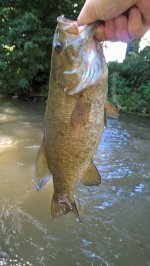I
Ichthus
New member
- Joined
- Sep 23, 2016
- Messages
- 9
Last year was my first year fishing for smallmouth on the fly. I had good success but caught mostly smaller fish in the 9-12 range. This year I've hooked four large bass (I'm guessing 16-18 range). But, I keep loosing them, not breaking them off, but spitting the hook. Anyone have some sound advice on the best way to play and land a large smallmouth? Best to play it for awhile, bring it in quickly, play it on the reel, or just keep it tight?
Just looking for some tips so I can break this streak of loosing nice bass shortly into the fight! Thanks.
Just looking for some tips so I can break this streak of loosing nice bass shortly into the fight! Thanks.





